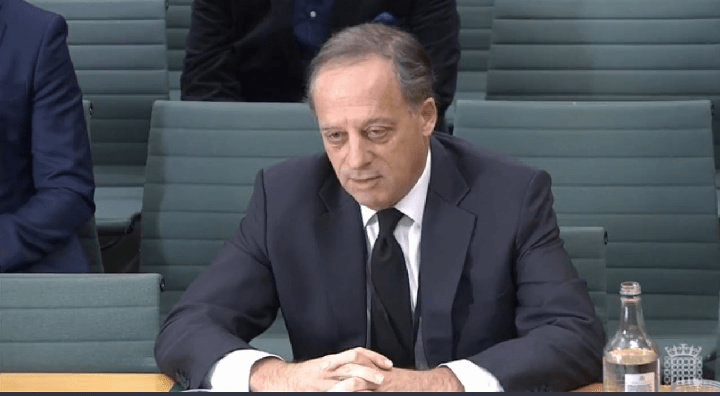It’s more bad news for the Beeb with a stinging set of Sunday papers today. The Culture select committee has released a report in the appointment of Richard Sharp as the Corporation’s chairman – and it makes for damning reading. The MPs accuse him of failing to publicly divulge his role in facilitating an £800,000 loan for Boris Johnson by omitting key details in introducing Johnson to businessman Sam Blyth. He is accused of making ‘significant errors of judgement’ and undermining the selection process for his role.
The omissions ‘constitute a breach of the standards expected of individuals’ applying for top public jobs. And while the MPs stop short of calling for Sharp to go, their conclusions suggest his future at the BBC ought to now be in doubt. The committee find that the chairman ‘should consider the impact his omissions will have on trust in him, the BBC and the public appointments process’. The implication is that Sharp has damaged not just the Corporation but the appointments process as a whole too.
It comes five days after a tough grilling for the former Goldman Sachs banker in which acting Culture chairman Damian Green seemed distinctly unimpressed with what he heard. Labour’s shadow Culture secretary Lucy Powell has seized on today’s report, suggesting Sharp’s position is ‘increasingly untenable’. Sharp’s team insist he has acted ‘in good faith’ throughout and point to the previous reassurance he received from the Cabinet Office that there has been no conflict of interest.
The select committee report does not limit its criticism to just Sharp. It also calls on Simon Case to clarify his role in the saga. Sharp says he never gave Johnson financial advice, which begs the question then as to why Case drafted a memo for the then Prime Minister in December 2020 on why he should ‘no longer’ seek Sharp’s ‘advice on your personal financial matters.’ Its conclusion is pretty withering of the government too, arguing that:
the fact that Ministers have cited this Committee’s original report on Mr Sharp’s appointment as a defence of the process was followed, when we were not in full possession of all the facts that we should have had before us in order to come to our judgement, is highly unsatisfactory.
So, what now? There is little indication that the government will seek Sharp’s resignation and the man himself shows no sign publicly that he intends to quit. What might do for him is the reaction from within the Corporation to this report. The Observer today suggests ‘the affair has caused serious anger within the BBC’ and carries anonymous quotes from a senior executive suggesting that the government is actively undermining the Beeb’s editorial independence. Sharp’s decision to sit in on the meeting to decide the director of news last year was heavily criticised by former staff. If more damaging stories involving current or former staff emerge then that could undermine Sharp’s authority still further.
Today’s report is by no means the end of the affair. There are at least two further investigations for Sharp to endure. One inquiry into the BBC chairmanship selection process is being overseen by Adam Heppinstall KC; the other is by the Corporation into whether any further conflicts of interest occurred since the chairman joined. Sir Laurie Magnus, the ministerial ethics advisor, could decide to make it a hattrick should he deem Boris Johnson’s involvement worthy of yet another probe.







Comments